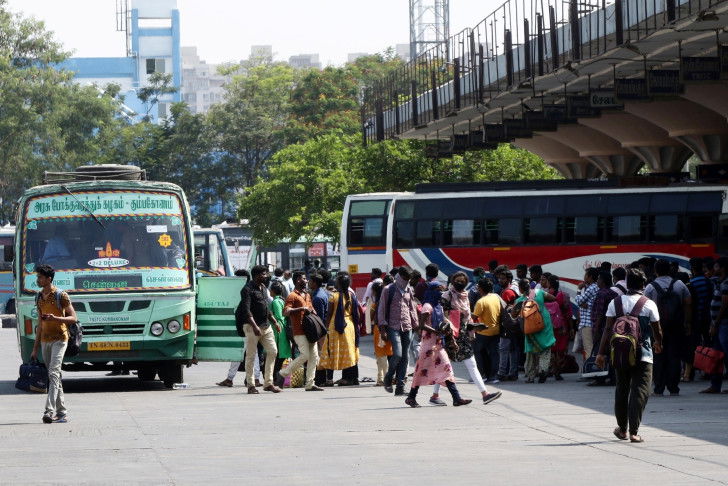Business
TN state transport orders bus conductors not to accept Rs 2,000 notes from passengers

Chennai, May 22
The Tamil Nadu State Transport Corporation, Tirunelveli, has issued a circular instructing bus conductors not to accept Rs 2,000 denomination notes from passengers or exchange the same for lower value note.
Oral instructions have been given by other State Transport Undertakings to their bus conductors on similar lines.
Meanwhile, retail outlets and fuel stations have also stopped accepting Rs 2,000 denomination notes.
Meanwhile the State Bank of India (SBI) has issued a circular instructing the branch officials not to ask the public who come for exchange of the Rs 2,000 notes to fill in a challan/slip.
"The RBI has clearly stated that the Rs 2,000 notes will continue to be a legal tender and hence it is not understood as to why all these details are required to be submitted to the bank by the public for exchanging the notes. It is cumbersome for the public as well as for the bank employees/officers," said C.H. Venkatachalam, General Secretary, All India Bank Employees' Association (AIBEA) in a letter to Indian Banks' Association (IBA).
Stating that the prescribed procedure is unwarranted, Venkatachalam urged IBA to come out with a uniform procedure for banks to follow while exchanging the Rs 2,000 notes.
"The bank management are yet to come out of the Rs 500/Rs 1,000 banknote demonisation syndrome. Demonitisation is different and withdrawal of Rs 2,000 note is different," Venkatachalam told IANS.
The slip for exchange and deposit of Rs 2,000 banknotes has its roots in the RBI's May 19 circular to the banks on the withdrawal of the said currency.
"Deposit of Rs 2000 banknotes into accounts maintained with all banks can be made in the usual manner, that is, without restrictions and subject to compliance with extant Know Your Customer (KYC) norms and other applicable Statutory requirements. The banks shall also be required to comply with Cash Transaction Reporting (CTR) and Suspicious Transaction Reporting (STR) requirements, where applicable," the RBI circular notes.
On May 19, the RBI said it will withdraw all the Rs 2,000 banknotes as a part of its clean note policy and added that it will continue to be a legal tender.
According to the RBI, people may deposit Rs 2,000 banknotes into their bank accounts and/or exchange them into banknotes of other denominations at any bank branch.
"Deposit into bank accounts can be made in the usual manner, that is, without restrictions and subject to extant instructions and other applicable statutory provisions."
The central bank said in order to ensure operational convenience and to avoid disruption of regular activities of bank branches, exchange of Rs 2,000 banknotes into banknotes of other denominations can be made upto a limit of Rs 20,000 at a time at any bank starting from May 23.

11 hours ago
Air India cancels multiple flights as Ethiopian volcanic ash drifts into Indian airspace

11 hours ago
India and EU discuss shared security challenges, early conclusion of defence partnership

11 hours ago
Netanyahu's office working on new date for visit, says Israeli PM has 'full confidence' in India's security under PM Modi

17 hours ago
After Hindu protest, global online retailer Shein removed Lord Ganesh blanket & doormat

18 hours ago
As Deol family battles grief, here's how Karan Deol fulfils final responsibilities for grandfather Dharmendra

18 hours ago
Juhi Chawla revisits her childhood obsession with Dharmendra’s classic ‘Sholay’

18 hours ago
Manoj Bajpayee talks about Nagaland and how its people are connected with nature

18 hours ago
Riteish Deshmukh shares how son Riaan helps him appreciate life’s simple joys

18 hours ago
Kareena Kapoor wishes ‘darling bro’ Armaan Jain on b’day: Can’t wait to celebrate soon

18 hours ago
Vijay Sethupathi welcomed on board the unit of Vetrimaaran's 'Arasan'

18 hours ago
President Murmu tells young IRS officers to uphold integrity, fairness

18 hours ago
Gujarat to hold padyatra in honour of Sardar Vallabhbhai Patel

18 hours ago
When Dharmendra brought the horrors - and bravery - of the 1962 war to all Indians' homes






















